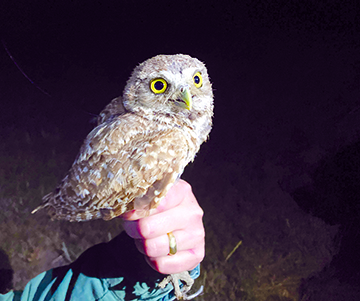Current Temperature
Burrowing owl makes it home from milestone first winter migration
Posted on August 22, 2024 by Ryan Dahlman Commentator/Courier Photo Courtesy of the Wilder Institute. MIGRATION: A picture of Green48, the burrowing owl who has returned to southeast Alberta after a long wintering season in Mexico.
Commentator/Courier Photo Courtesy of the Wilder Institute. MIGRATION: A picture of Green48, the burrowing owl who has returned to southeast Alberta after a long wintering season in Mexico.By Anna Smith
Southern Alberta Newspapers
Local Journalism Initiative Reporter
The Wilder Institute holds hope for the future of endangered burrowing owls after the successful return of one individual to the prairies.
“For the first time since the program began in 2016, a head-started burrowing owl has migrated to Mexico, overwintered and returned to nest in Alberta,” said Graham Dixon-MacCallum, conservation research population ecologist at the Wilder Institute.
The institute’s team recently had a reunion with Green48, identified by a bright green leg band used by the Archibald Biodiversity Centre to mark owlets that came under human care.
Green48 was brought into the head-starting program in July 2022 as an owlet unlikely to survive her first year of life. After spending the winter under the care of staff, she was released back to the prairies in May 2023 into an artificial burrow, explained Dixon-MacCallum.
The owl started her first migration in October 2023, equipped with a small, solar powered transmitter that allowed her location to be tracked. This migration is a long and taxing journey, and many owlets do not survive their first attempt.
In March 2024, Green48 began her return north, travelling through several U.S. states back to Alberta, where she and her mate settled 60 km from the CFB Suffield National Wildlife Area. This is close to where she was initially released after her time in human care.
The Wilder Institute noted an abundance of songbird feathers scattered around her burrow, indicating that Green48 and her mate are exceptional hunters, and using a burrow scope, the field team has observed at least three nestlings in her burrow.
“Having this burrowing owl return and nest is an example of why we should be hopeful for this endangered species,” said Dixon-MacCallum.
The owl will continue to be monitored as she continues to reside in the province, as well as in her yearly migrations to Mexico for the winter. It’s stories like these, Dixon-MacCallum says, that highlight the impact of the head-starting program, which collaborates with partners and landowners to intervene when young owlets are unlikely to survive their first winter.
The program nurtures the young animals through the season and releases them in the spring when they have a higher chance of survival. To date, the Wilder Institute has released 145 head-started burrowing owls back into their natural range. Further information on the program can be found on the Institute’s website, at wilderinstitute.org.
Leave a Reply
You must be logged in to post a comment.

